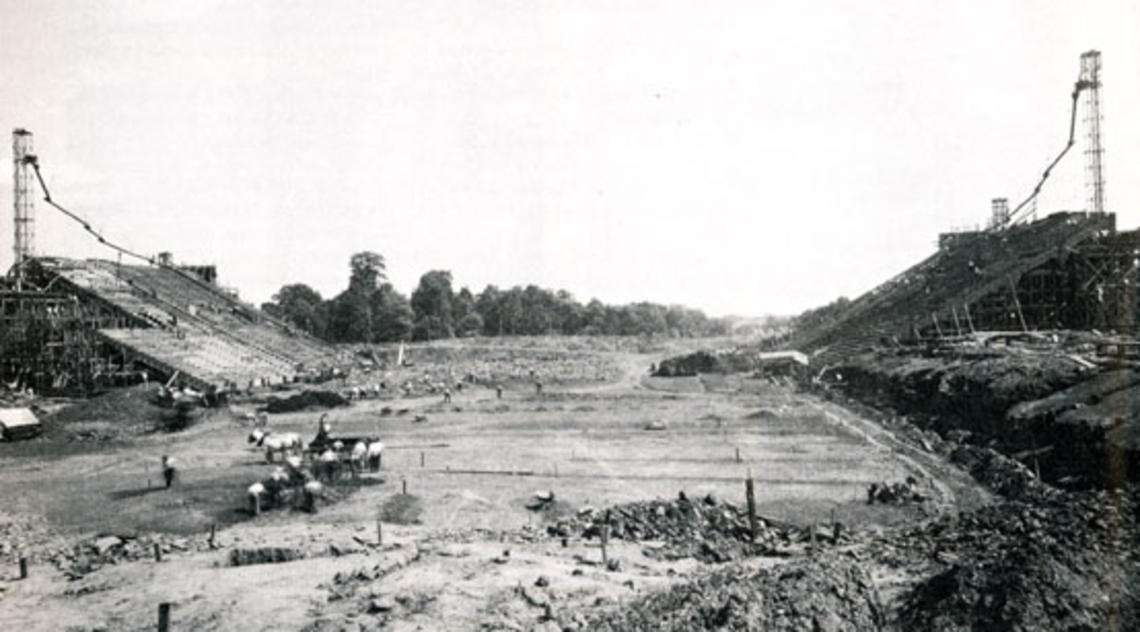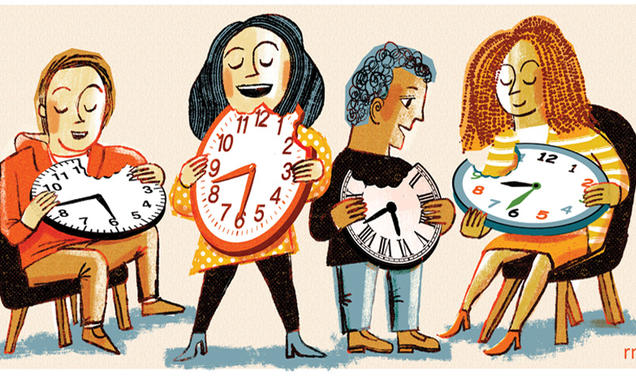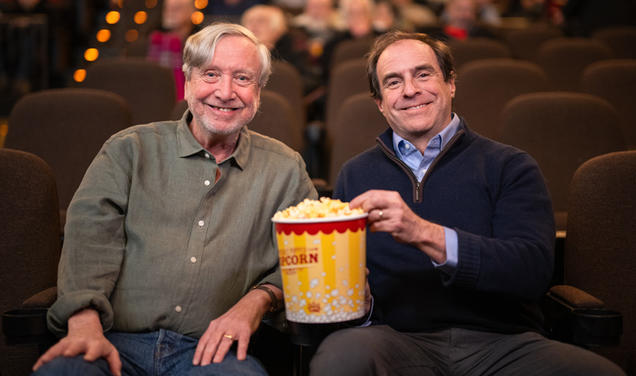
Princeton football practice kicks off this week, and in September, Princeton Stadium will begin its 12th year as the team's home. But the familiar venue still has a long way to go to match the history of its predecessor, Palmer Stadium, the Tigers' legendary lair from 1914 to 1994.
Just before the start of the 1974 football season, Palmer's 60th anniversary year, PAW contributor Dan White ’65 took a look back at the stadium's construction and its enduring charm. See story below.
PAW, Sept. 24, 1974
New season at Palmer
By Dan White ’65
It's season number 105 for Princeton football, and George Boccanfuso is on patrol. It's 7:30 a.m., and he is in his Navajo red station wagon cruising the cinder track that encircles Palmer Field, checking for crab grass and leaf fungus that might have invaded during the night to root among the Marian Blue that grows straight and thick down the center of the field. Boccanfuso is head groundskeeper and curator of one of America's finest specimens of a dwindling number of natural grass football fields. Since last November, he and his crew have been preparing Palmer Field for the start of the new season in three weeks.
Marian Blue is a pure, proud grass that looks like it was cut from the front lawn of an English manor house where it was used for nothing more violent than teas and croquet. Boccanfuso buys it in 500 and 1,000 square-foot sections from the Updike brothers, sod farmers off Quaker Bridge Road toward Trenton. Football cleats don't grind it up the way they do the Bent grass along the perimeter of Palmer.
Bent has short, curly roots and tears loose in divots the size of door mats. Boccanfuso is gradually transplanting the Bent to practice fields and replacing it with Marian Blue.
The Blue also resists the tiny leaf fungus that in July, August, and September, the months of high humidity, can rot a grass field and leave brown-outs the size of manhole covers.
Boccanfuso has been at Princeton 27 years and knows what to watch for. He powders Palmer Field once a week with a mixture of 400 gallons of water and 42 pounds of "Spot Treat," a super Clearasil that leaves Palmer the color of lime cheescake.
Today is going to be hot. There's already a haze of heat overhead. At this moment, Princeton's 1974 football team is in its air-conditioned barracks in Caldwell Field House. The players just woke up. They are yawning and stretching and sipping juice. They're going to walk over to Jadwin Cage to do their early morning exercises before they come outside for their regular morning practice. Breakfast is at 10:30.
Yellow oxide. That's what color Palmer Memorial Stadium is in the morning light. Like Monet's cathedral Palmer changes colors throughout the day. This evening, it will be champagne -- later, the color of old latex-paint walls. It's just Boccanfuso and a few of his men inside this big jawbone of a stadium. It's quiet and kind of transcendental.
H. J. Hardenbergh designed Palmer Stadium in 1914. He also designed Palmer Physics lab, the Waldorf Astoria, and the Plaza Hotel in New York City.
The George A. Fuller Company of 111 Broadway built the stadium for only $300,000. Fuller split his workmen into two groups, and they raced each other from the open end to the closed end of the stadium. They constructed the stadium in wooden frames, a section at a time. They hauled concrete up towers behind the frames and poured it down conduits that swung out 135 feet like airborne toboggan runs and covered every cubic inch of the wooden molds.
The West reached the turn at the northern end first to win the Great Race. The East complained that the land sloped downward on their side and required more concrete work. The sum total of concrete was 13,000 cubic yards, including 718 supporting columns.
As a load test, the engineers piled 100 tons of sandbags on a section of the bleachers, packing 150 pounds to the square foot. They said each of those 41,000 seats could bear four times the weight of an alumnus even when he was stamping up and down during the fourth quarter of a Yale game.
Sixty-six feet below the promenade on the playing field horse-drawn blade-graders and King-drags were cratering and leveling, underdraining and sodding old Laughlin field and a stretch of land that had been cultivated as a self-help farm for undergraduates. Despite the excavations, the student-farmers harvested 3,000 bushels of potatoes. The horses also obliterated the best mint bed in central New Jersey.
Remarkably, in four months, from June to October, 1914, it was completed, the third-youngest football stadium in the country after Harvard and Syracuse. Here were the statistics:
SEATS: 41,000
EXITS: 26
LENGTH: 672 feet
WIDTH: 520 feet
FIELD LENGTH: 517 feet
FIELD WIDTH: 250 feet
HEIGHT OF FIELD TO PROMENADE: 66 feet
NUMBER OF COLUMNS: 718
NUMBER OF SEAT ROWS: 48
WIDTH OF CONCOURSES: 20 feet
WIDTH OF PROMENADE: 12 feet
NUMBER OF TOILET ROOMS: 8 (4 Men; 4 Women)
LENGTH OF TRACK: 440 yards
A few more than 7,000 fans showed for the dedicatory game between Dartmouth and Princeton. Princeton won, 16-12. Seven thousand? A professor of classics suggested Palmer might make a fine outdoor theater for Greek tragedies. Two weeks later, for the Yale game, 36,500 marched into Palmer. Although Princeton lost, 19-14, it was a triumph for H. J. Hardenbergh and the Fuller Construction Company. If reinforced concrete could survive the Yale game, it could survive anything. Seven years later in 1921, 53,000 would crowd into Palmer to watch Princeton beat Harvard, 10-3, an attendance record that still holds today.
As it turned out, H. J. Hardenbergh and the Fuller Company had made a slight mistake. It seems that after a few New Jersey winters, the stadium began to sway and groan and crack here and there. After a thorough study, engineers announced that the cement structure was a victim of thermal expansion. They cut out pieces of cement as if they were slicing up a huge cement angel food cake and covered them over with long wooden planks for spectators to sit on.
The swaying and groaning and cracking abated. Palmer survived. It has outlasted depressions, wars, and blizzards. It has endured single-wing football, generations of alumni and undergraduates jumping around waving white handkerchiefs, cacophonic attacks by legions of marching bands, and the flocks of pigeons who make their nests under the rounded arches.
It has survived even the relentless ivy that beards its exterior columns from top to bottom. In tribute to its graceful endurance, Palmer will have a 60th birthday celebration before the Cornell game on November 23.










0 Responses